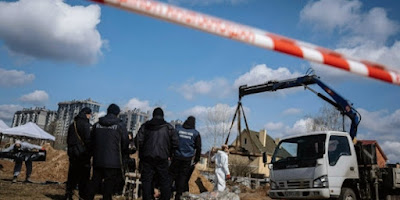The results of investigations into war crimes are being shared directly with Ukrainian authorities by an increasing number of EU nations.
"Never before has the legal community responded to an armed war with such speed and decisiveness as it is doing right now in Ukraine," the author writes. On Tuesday in The Hague, the Slovakian President of the European Union's Judicial Authority, Eurojust, Ladislav Hamran, made the statement. The Joint Investigation Team (JIT) of Eurojust presently consists of six different states in addition to the International Criminal Court (ICC).
In March, Lithuania, Poland, and Ukraine came together to establish the Joint Investigation Team (JIT). In April, Karim Khan, who is from Britain and serves as the top prosecutor for the International Criminal Court, participated in a JIT for the very first time. Now following in their footsteps are Estonia, Latvia, and Slovakia.
In a JIT investigation, all witness testimony, photographs, and expert reports are accessible to all of the investigators. Eurojust takes measures to guarantee that all documents are translated into English. According to the President of Eurojust, "the war in Ukraine is the best-documented military conflict in the history of the world."
In addition to this, Eurojust provides financial assistance to the JIT by covering expenses like as travel, lodging, and interpreters for witness interviews.
A last-minute amendment to a regulation governing Eurojust will go into effect on June 1. This amendment will make it possible for Eurojust in The Hague to store, examine, and transfer data pertaining to Ukraine to the International Criminal Court. It was approved by a vote of the Eurojust board of directors. Hamran expressed his happiness by stating, "This was determined in lightning speed by the EU organizations." It was only last week when the European Parliament gave its approval.
Along with the expanded responsibilities, Eurojust will also receive an increase in funding and personnel. Eurojust is the European Union's agency for cooperation in criminal cases. It was established in the year 2002. The year 2018 marked the beginning of Eurojust's collaboration with Ukraine.
Iryna Venediktova, the Prosecutor General of Ukraine, made this point clear when speaking in The Hague: "Ninety-five percent of investigations into war crimes in Ukraine must be carried out by Ukrainian investigators." [Citation needed] "However, we have previous experience with crimes of war. "Russian aggression began in 2014," she added, alluding to Russia's annexation of Crimea and the construction of separatist "people's republics" in Donetsk and Luhansk with support from Russia. She was referring to events in eastern Ukraine.
According to Venediktova, investigators in Ukraine are presently looking into around 15,000 different instances. The Attorney General stressed that on a daily basis, between 200 and 300 new cases are being added. Approximately one thousand processes are connected to events that occurred in the part of Donbass that is seized by Russia. According to Venediktova, "Our investigators are unable to work there on site; but, they are able to, for example, interview refugees."
According to the chief prosecutor in Ukraine, five persons have already been convicted of various crimes; three Ukrainian troops have been found guilty of murder, while two Russians have been found guilty of destroying civilian property. Investigators in Ukraine have already gathered information on another 80 potential suspects. In the next days, decisions will be made regarding the torture of Ukrainian people by Russian troops and the rape of a Ukrainian lady by a member of the Russian army. Both of these cases will be heard in Ukraine.
A journalist from the Netherlands expressed concern that it was too soon to have such trials while the nation was still engaged in armed conflict. Venediktova shook her head as she responded. "Only outsiders ask such things," she said, "at home, we are questioned why everything is taking so long." After the decisions have been made, the cases are only submitted to the judge for a ruling.
Venediktova emphasized that the financial resources for the Ukrainian investigations come from the national budget of Ukraine. "However, we are grateful for the assistance of specialists from other countries." Equipment donations are also appreciated and might include things like laptops, printers, helmets, and protective jackets. As a defense for her actions, she said that "we detectives operate close to the front."
Investigative teams from Lithuania, Slovakia and France are now working in Ukraine and are aiding local investigators. In addition, ICC Prosecutor Khan recently deployed a team of 42 investigators, thirty of them are from the Netherlands. Poland has already examined 1,100 of the roughly 3.5 million refugees who have fled from Ukraine as witnesses to suspected war crimes.
According to Khan, outside the JIT nations, additional 13 governments have initiated their own investigations into war crimes in Ukraine. About half of them are EU nations, noted Eurojust CEO Hamran. Presumably Germany is also listed here, where Attorney General Peter Frank has so far just taken out structural inquiries without definite suspects.
"The most essential thing is that everyone works together," said ICC Chief Prosecutor Khan, "it's about collaboration, not competition."

